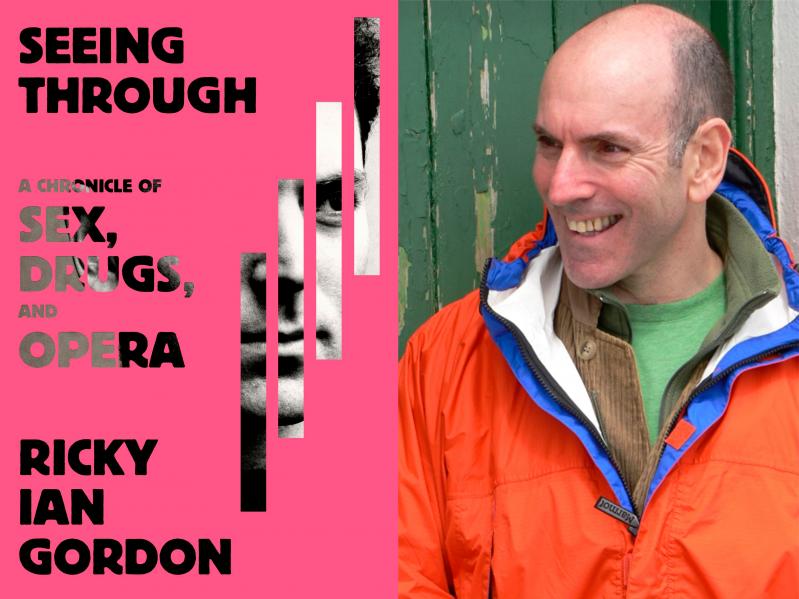“Seeing Through”
Ricky Ian Gordon
Farrar, Straus and Giroux, $32
In an autobiography that is at once heartbreaking and heartwarming, distressing and inspiring, bone-chilling and at times humorous, Ricky Ian Gordon tells the story of his life as a composer, with all of its immense difficulties and stellar successes. From his deeply troubled childhood as a gay Jewish boy on Long Island, and early years of serious alcohol addiction as well as great love of music and poetry, to his rise to high acclaim in the fields of art song, musical theater, and opera, Mr. Gordon grabs on to a life that is larger than life, and it is quite a ride.
The title of the book, “Seeing Through,” comes from a quote by the American poet Brenda Hillman — “The job of living is to be seen through” — and Mr. Gordon removes any veneer or pretenses so we see through to the raw realities of his experiences, whether painful or exhilarating.
The subtitle of the book, “A Chronicle of Sex, Drugs, and Opera,” perhaps has a bit of whimsy, and the book is indeed a chronicle of every aspect of his life, mostly interesting, often stirring, but perhaps sometimes with too much information.
Sex: He writes explicitly of his sexual fantasies and encounters as a youth, his numerous flings and relationships along the way, and his maturing, deep sense of love with his present husband.
Drugs: In the first decades of his life, addiction to alcohol and drugs as well as shoplifting was ever present and destructive, but after he became clean in his early 30s his career as a composer really blossomed.
Opera: Ah, yes, and opera! Just by chance, when he was a child he randomly took a book off a shelf, and “The Victor Book of the Opera” was in his hands. “I was a different person within the hour. My axis had shifted.”
Fast-forward to his time at Carnegie Mellon University at the early age of 16, where he studied piano, composition, and acting. He then settled in New York City, and eventually became a recognized composer. But not without its issues.
“Music is a language that never stops talking in my head. When I was growing up, I just loved what I loved, and life was simple. But when I claimed the mantle of composer, music became not always a pleasure but an indictment, a gun, an arrow to pierce my confidence or a lance to free my envy and jealousy.”

One of my favorite chapters is on his opera “The Grapes of Wrath,” which premiered in 2007, and was just performed at Carnegie Hall earlier this year. He takes us through the laborious processes of commissioning, working with a librettist, writing and trying out small sections of the work, how his music evolved when he moved from pencil-and-paper composing to using computer software, and the many ups and downs and breathless moments along the way until the nerve-racking opening night.
There are similar chapters on other works, such as his operas “27,” exploring the lives of Gertrude Stein and Alice B. Toklas at Stein’s salon at 27 Rue de Fleurus in Paris, and “The Garden of the Finzi-Continis,” about a Jewish family in Italy in the time of Mussolini.
He gives an insightful and metaphorical description of his writing process: “Before I write an opera, when I am in the thick cloud of terror and excitement before starting a piece, or the profligate misery of procrastination, a shadow slowly starts pressing against my back, telling me what the opera will be like. I don’t hear specific notes and sounds, but it is an energy, a force, and when I finally put my hands to the piano and my pencil to the paper, the shadow begins to become whole, vivid, and detailed. It’s as if it always existed and you were being readied for its passage through you.”
Most poignant in “Seeing Through” are the chapters on living as a gay man in New York City through the harrowing AIDS crisis, with its immense loss, and about his partner Jeffrey with AIDS whom he lovingly cared for until the end.
Mr. Gordon also writes extensively about his mother, father, and three sisters, with astute and sympathetic observations.
Whatever the event or subject, Mr. Gordon feels and observes with the greatest passion, and often remembers it decades later with the same intensity.
A center section of black-and-white photos, from childhood to the present, with many of the people and productions he mentions, adds a warm visual touch. His significant body of work is reflected in an appendix listing 40 recordings, 34 publications, and 60 compositions, many of which are full-length operas.
One section of the book is called “Obsessions,” and there are many in Mr. Gordon’s life; in fact some form of the word appears often throughout the pages. A few of his obsessions are Joni Mitchell, Stephen Sondheim, Stravinsky, Olivier Messiaen, and numerous men. And bodily functions.
Most of the book is quite engaging, but at 450 pages I wondered at times if fewer details, real and utterly honest though they may be, would ultimately make for better reading. He names names in the musical theater and opera worlds, and tells tales, sometimes embarrassing or lurid, that I suspect some would rather not see in print.
He says at one point that “it is important for me to be naked in my work, because self-censorship means safe, less dangerous, and consequently less interesting.” Some readers may find this appealing, but there were moments when I thought the minutiae — no-holds-barred, sometimes salacious — bogged down the message of the narrative.
Over all, I recommend “Seeing Through” as an intimate journey into the roller-coaster life of an outstanding contemporary artist, with the reservations mentioned above.
There is a powerfully written passage in the middle of the book that points to the essence of Mr. Gordon’s message: “But at my best moments, when the clouds part temporarily, when the meds are working . . . when I have just meditated and for a moment there is nothing in me but silence, wind, and maybe even God’s love, I can tell you this: I see genuine beauty in what I have made, genuine beauty out of the shards of glass that are my life.”
Thomas Bohlert regularly writes about chamber music for The Star. The director of music for the East Hampton Presbyterian Church from 2000 to 2016, he lives in Springs.

